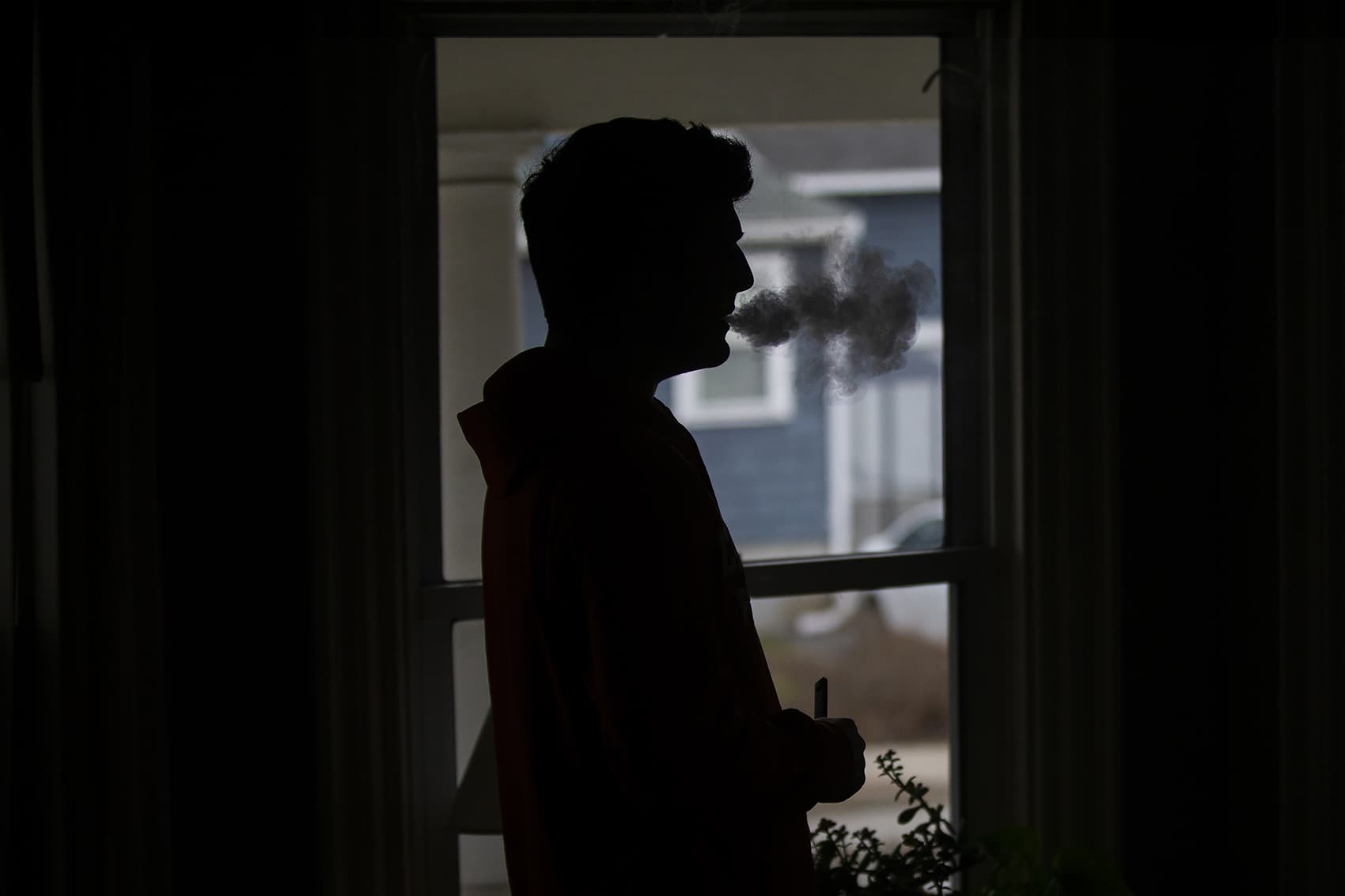Advertisement
'Like A Runaway Train': Mass. Schools Invest More Resources To Curb Teen Vaping
If you ask high school students in Massachusetts about electronic-cigarette use, or vaping, they’ll tell you it’s everywhere.
"It screams at you," says Victor, a 17-year-old in Newton. "In the bathrooms, you’ll always see kids hitting JUULs. You’ll always see packs of pods in the trash cans at our schools."

JUUL is one of the most popular e-cigarette brands on the market. The pods are vapor producing cases you put inside, often containing nicotine.
"It’s such a quick thing," explains Victor. "You can go to the school bathroom. Have a little fun for a second and then go back to class."
We’re only using Victor's middle name because he’s a minor, and you have to be 21 to buy tobacco products like e-cigarettes in Massachusetts.
Victor has been vaping for almost two years now. He started out as an occasional user because it was fun and he liked some of the flavors, like mango. But he admits: he’s addicted.
"I always have it in my pocket. It's always next to me," he says. Adding, he never goes anywhere without having a backup pod in case he runs out.
Teen vaping isn’t new. It’s been happening in relatively low levels since e-cigarettes came on the market in the early 2000s. But in the last two years, the trend skyrocketed. Nationally, the CDC says teen e-cigarette use went up 77% between 2017 and 2018.
"At first, we didn’t know what this was: marijuana or tobacco," says Newton North High School principal Henry Turner. Staff first noticed the spike because they were catching more kids vaping in the bathroom. Initially, their response was mostly punitive. But soon, officials realized that just suspending kids wasn’t enough to make a dent.
Advertisement
"We’re finding this is an addiction issue," Turner says now.

In the last year and a half, the Newton community has launched multiple new efforts to try and get a handle on teen vaping. They’re adding anti-vaping lessons to the district’s middle school health classes.
"We are educating the faculty, showing them devices. We go to parent nights," says Jodie Cohen, an anatomy teacher at Newton North High School and chair of the school’s committee on substance use. The school even hired an improv group made up of people recovering from substance use disorders to talk to the students about addiction.
And Newton isn’t alone. In Plymouth, public schools recently added smoke alarms that are sensitive enough to detect e-cigarette vapor in the bathrooms. In Holbrook, they took off the door to the boys' bathroom near the cafeteria and set a two person limit.
"It’s been a runaway train and now we’re trying to grab the reins," says Margie Skeer, the interim director of the Master of Science in Health Communication at the Tufts University School of Medicine.
"Fear alone is usually not an effective strategy," she says. Simply telling people to quit something because it’s not healthy almost never works. The most effective campaigns, according to Skeer, target the things people value. For teenagers, those values are often independence, control and the feeling that they're attractive or people want to date them.
"What is also of value to this current generation is the collective good and some social justice related things," Skeer adds. One example, the Truth Campaign's use of the phrase "let's be the generation to finish it" in their current messaging.
And Skeer says, it can’t just be a one-off. The message has to come from multiple angles — from school assemblies to social media.
But there are a lot of people who say the companies making e-cigarettes need to step up, too. JUUL is facing several lawsuits. A recent one filed by the Northeastern Public Health Institute argues JUUL is using deceptive marketing to teens.
JUUL wouldn’t agree to a taped interview but sent a written statement saying: “No young person or non-nicotine user should ever try JUUL.” They’re also supporting national efforts to increase the nicotine buying age. The company recently dropped their Instagram and Facebook accounts in the U.S.
But right now, there still are thousands of kids who just can’t stop, like Victor.
He wants to quit vaping, but says finding the tools to do that successfully is hard. You have to be 18 to get nicotine gum or patches in Massachusetts without a doctor's prescription.
Victor's school has offered some help. One of the counselors there is tasked with finding ways to help students beat their nicotine addictions. She’s trying strategies that have been shown to help people stop smoking cigarettes like guided meditations or giving kids something to do with their hands. But this increase in teen vaping is still really new, and it could be another year or more until researchers know what works. For Victor, the best advice he has for his peers is just not to try it in the first place.
"I would say don’t start," he says. "It’s not worth it."
This segment aired on May 7, 2019.
